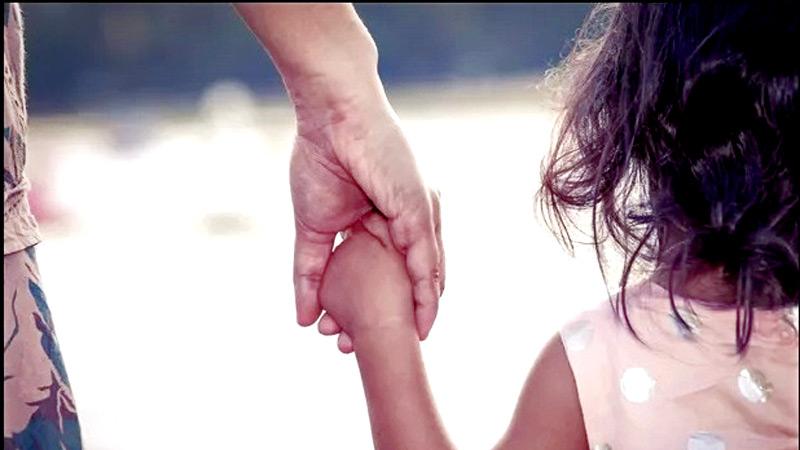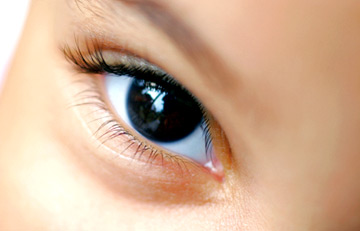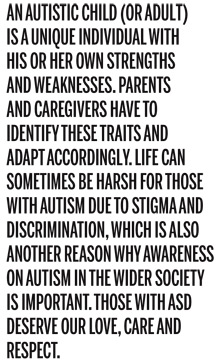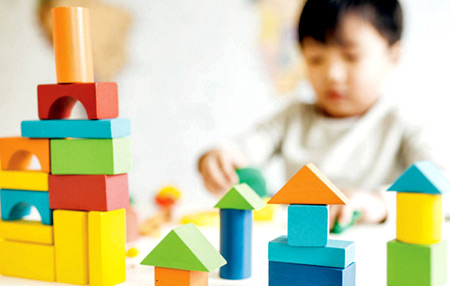
 We have all heard of the term autism, but awareness on this group of diseases or conditions, formally known as Autism Spectrum Disorders (ASD) is rather low, even among the medical fraternity.
We have all heard of the term autism, but awareness on this group of diseases or conditions, formally known as Autism Spectrum Disorders (ASD) is rather low, even among the medical fraternity.
Autism is a childhood condition that generally lasts into adulthood. Autism spectrum disorder is a neuro-developmental disorder that can cause deficits in three main areas: language communication skills, social interactions and restricted-repetitive behaviors. Other characteristics are atypical patterns of activities and behaviours, such as difficulty with transition from one activity to another, a focus on details and unusual reactions to sensations. Around one child in 160 has ASD.
 The abilities and needs of people with autism vary and can evolve over time. While some people with autism learn to live independently, others have severe disabilities and require life-long care and support. Autism often has an impact on education and employment opportunities. In addition, the demands on families providing care and support can be significant.
The abilities and needs of people with autism vary and can evolve over time. While some people with autism learn to live independently, others have severe disabilities and require life-long care and support. Autism often has an impact on education and employment opportunities. In addition, the demands on families providing care and support can be significant.
Attitudes
Societal attitudes and the level of support provided by local and national authorities are also important factors determining the quality of life of people with autism. Characteristics of autism may be detected in early childhood, but unfortunately, autism is often not diagnosed until much later.
People with autism often have co-occurring conditions, including epilepsy, depression, anxiety and attention deficit hyperactivity disorder as well as challenging behaviour such as difficulty sleeping and even self-injury. The level of intellectual functioning among people with autism varies widely, extending from profound impairment to superior levels.
 The World Health Organisation (WHO) and the United Nations have teamed up to raise awareness on autism around the world through the World Autism Awareness Day, which fell yesterday (April 2). This year, the focus will be on inclusive education for autistic children, as per the UN mission of “Leaving No One Behind” (Sustainable Development Goals on Education).
The World Health Organisation (WHO) and the United Nations have teamed up to raise awareness on autism around the world through the World Autism Awareness Day, which fell yesterday (April 2). This year, the focus will be on inclusive education for autistic children, as per the UN mission of “Leaving No One Behind” (Sustainable Development Goals on Education).
Over the past decade, major progress has been made towards increasing access to education generally, as well as for persons with autism specifically. However as the Covid-19 pandemic spread across the globe, a majority of countries announced the temporary closure of schools, impacting more than 90 per cent of students worldwide. Many students with autism have been especially hard hit and studies show that they have been disproportionately affected by disruptions to the services and support structures they rely on.
No clear-cut answer
Since autism is not a physical disease per se, scientists are still learning about it. There is a lot still unknown about ASD and there is not even a clear-cut answer to why boys and girls show signs of ASD differently. Generally, ASD is identified in more boys than girls, but this could be due to the fact that boys with ASD tend to be more hyperactive and outward than girls. Since boys show more outward behaviour, and parents are more likely to notice, boys are diagnosed at a higher rate than girls. Autistic girls display more internalising behaviour like depression and anxiety. Thus they are more likely to get diagnosed as they get older.
Autism may be a lifelong disorder, but it does not take away from the value of life your child will have. With different kinds of therapy and interventions, and with early prognosis, children can learn and develop the skills they need. The earlier autism is diagnosed, the better the course of treatment. It is important to remember that treatment is available in the following areas: Speech therapy for language development; sensory integration for sensory and stimulus management; Physical therapy for fine motor skills. The sooner you begin treatment, the better the outcome.
There is even a collective term for these treatments - Applied Behavioural Analysis (ABA). During ABA, life lessons and basic tasks are broken down into their simplest parts and the desired answers or behaviour act as rewards, and the undesired responses are completely ignored.
Teaching communication with others
A variation of this is Pivotal Response Training (PRT), which takes place in the real world. This is essentially about teaching communication with others and training on those social and communication skills. Moreover, as autistic children get older, the parents usually have to opt for medication to help treat associated conditions such as depression, anxiety and aggression. People with ASD have their own perceptive thought process, and medication can help loosen that rigid thinking and help if there is any extremely aggressive behavior.

There are many misconceptions in society on ASD due to the lack of awareness. It is often heard (and thought) that people with ASD cannot be successful. While there is a range of challenges people with ASD face, there are also unique characteristics and strengths they possess. Children and adults with ASD can be successful in life, especially with caring guardians, right support systems, early diagnosis and treatment.
Another common misconception is people with ASD cannot develop lasting relationships. But autistic children can develop friendships and enjoy playing. Many people also believe that those with ASD do not have emotions comparable to those of ‘normal’ individuals. Yes, they may have trouble expressing emotions, but they still have feelings like any other individual. This is a major challenge for parents and family members. Furthermore, they might struggle with seeing and ‘reading’ emotional cues of other people. Again, parents and caregivers have to bear with this trait.
Hoping for the best
As often mentioned by medical practitioners who work with autistic children and adults, the key word with ASD is hope. There is hope that with time, social skills and training will develop.
There is also hope for better outcomes through the immense amount of research happening in the field of autism. Scientists are learning more about the origins/genetics of ASD and how to improve treatment options.
An autistic child (or adult) is a unique individual with his or her own strengths and weaknesses. Parents and caregivers have to identify these traits and adapt accordingly. Life can sometimes be harsh for those with autism due to stigma and discrimination, which is also another reason why awareness on autism in the wider society is important. Those with ASD deserve our love, care and respect.
